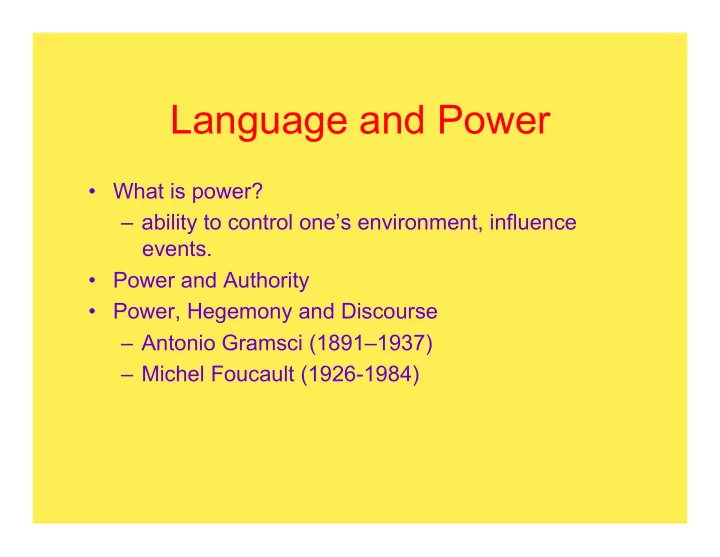

Language and Power • What is power? – ability to control one’s environment, influence events. • Power and Authority • Power, Hegemony and Discourse – Antonio Gramsci (1891–1937) – Michel Foucault (1926-1984)
Language and Power So far, we’ve been studying language as if it were a neutral system that just gets taken off the shelf and used, then put back unchanged. But language is a social practice, and every use carries the potential for change.
Language and Power So far, we’ve been studying language as a neutral system whose locutions have the same illocutionary and perlocutionary effect no matter who utters them. But the same utterances may be interpreted quite differently depending on who makes them - and what variety they make them in.
Do these maxims work the same in every circumstance?
power and perlocutionary force • Why are you stirring counter-clockwise? – Chemistry student to teacher – Chemistry teacher to student
Indirect speech acts Performing one speech act with the intention of performing another. • Can/Could you pass the salt? • Would you remove your hat? • It would be nice if you were quieter. • It sure is cold in here. • Can I have this by 3:00? – Boss to secretary – 1 secretary to another – Secretary to boss
Language and Power So far, we’ve been studying language as if it simply encoded predetermined meanings. But linguistic practice is the means by which we create new meanings.
Power, implicature, and pejoration Common historical patterns by which terms for women are pejorated. • Asymmetric pairs: master - mistress • Words that used to simply refer to a female: wench , bitch, Spanish puta • Words that originally applied to women and men: harlot (‘riff-raff’) • Words that were once neutral: hussy (‘housewife’) prude (‘virtuous’)
Dialect humor – another kind of pejoration http://www.blogthings.com/hillbillynamegenerator/ http://gangstaname.com/ http://joel.net/EBONICS/translator.asp http://www.writtenhumor.com/ebonics.html http://www.billism.com/eng_to_ebon_trans.html
Recommend
More recommend